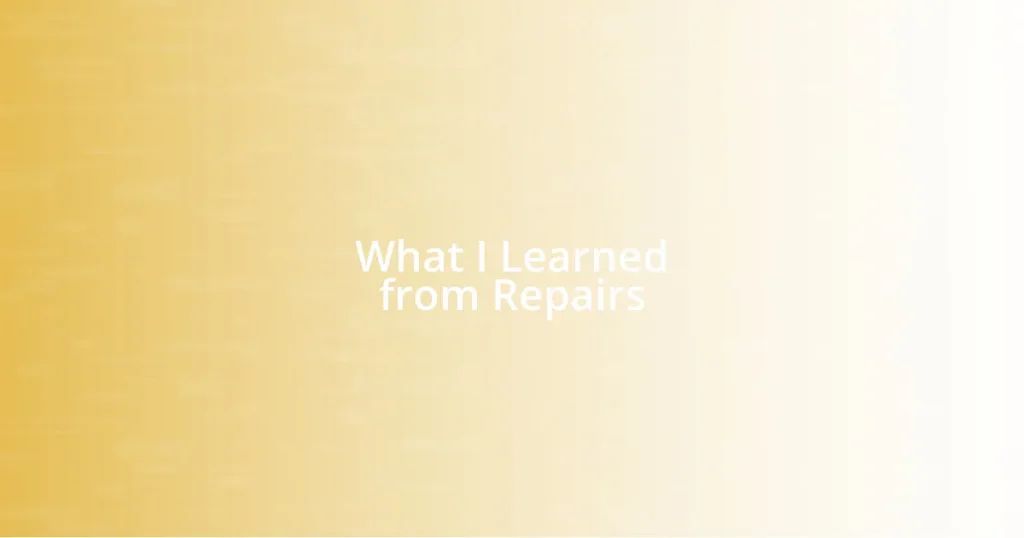Key takeaways:
- Neglecting minor issues can lead to larger, more costly problems; routine maintenance is essential.
- Hands-on experience fosters valuable skills such as problem-solving, patience, and resilience.
- Preparation and collaboration significantly enhance the efficiency and enjoyment of repair projects.
- Embracing mistakes as learning opportunities can lead to personal growth and confidence.
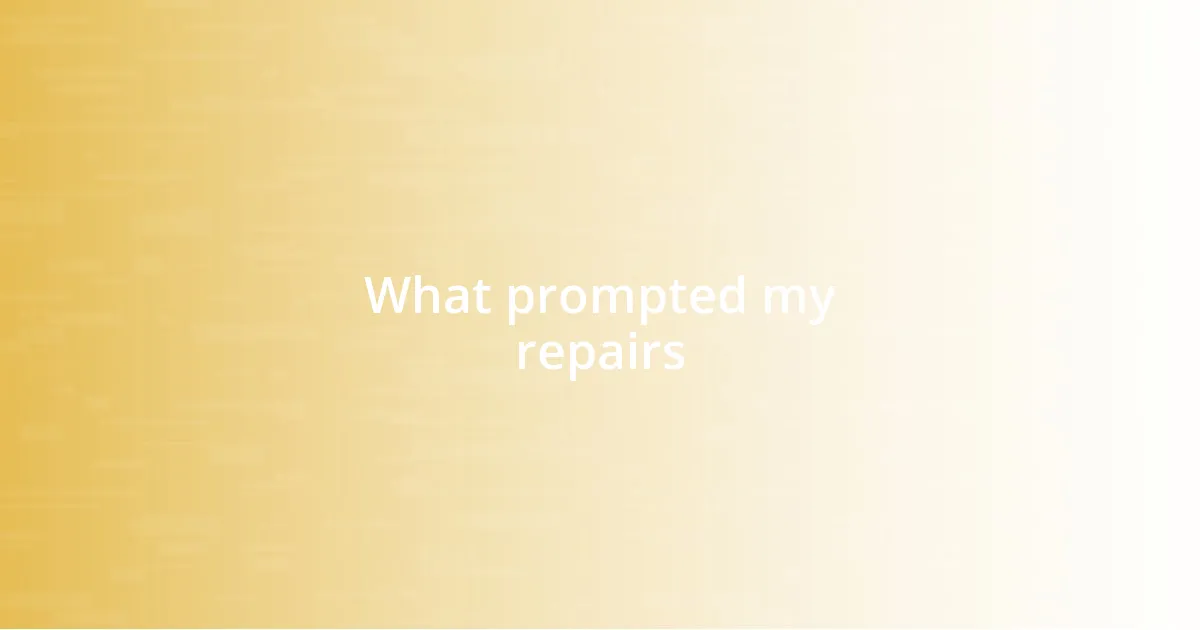
What prompted my repairs
It all started on a rainy Tuesday afternoon when I noticed a damp patch on the living room ceiling. The sight filled me with dread; memories of previous repairs flooded my mind. I couldn’t help but ask myself, “How did I let it get this far again?”
Then there was that moment when my old laptop crashed during an important presentation. I felt sheer panic coursing through me. At that instant, I realized that neglecting small issues could lead to a whirlwind of bigger headaches later on. Was I willing to face this frustration repeatedly?
More recently, I came to the realization that routine maintenance had become an afterthought. One squeaky door became the catalyst for reflection—a small annoyance that I could no longer ignore. It struck me that if I didn’t take action now, I would be inviting bigger problems down the line. Isn’t it fascinating how the smallest things can act as wake-up calls?

Key lessons from repairs
When I tackled those plumbing issues in my home, it was eye-opening. I learned that even minor leaks can lead to extensive water damage if left unchecked. Reflecting on that experience, I realized that the cost of immediate repairs often pales in comparison to the potential expenses from inaction.
Another lesson came when I attempted to fix my own car. To my surprise, understanding the engine’s basic components helped me identify the problem more efficiently. It’s empowering to know that a little knowledge can go a long way, transforming daunting repairs into manageable tasks.
One unforgettable learning moment was during a kitchen remodel. I underestimated the time and effort involved, thinking it would be a weekend project. However, as I navigated through unexpected challenges, I discovered the importance of patience and perseverance. I found that embracing the process, rather than rushing to completion, led to a more rewarding outcome.
| Lesson | Experience |
|---|---|
| Minor issues lead to bigger problems | Dealt with plumbing leaks that caused extensive water damage. |
| Knowledge is empowering | Learned to identify car engine problems, making repairs easier. |
| Patience is crucial | Kitchen remodel taught me to embrace the process for better results. |
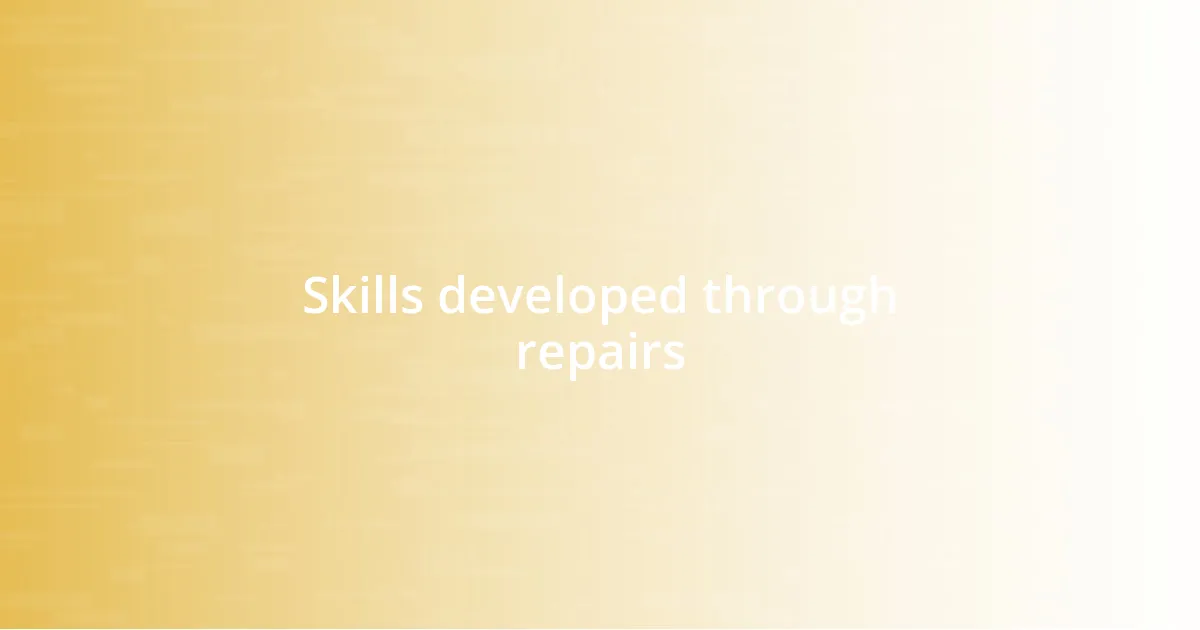
Skills developed through repairs
It’s amazing how much I’ve grown through repairing various things around my home. Each project I ventured into turned into a mini-adventure, challenging my limits and expanding my skill set. Take, for example, when I decided to repaint the living room; I was a bit intimidated at first. But as I mixed colors and learned the intricacies of brush techniques, I not only spruced up my space but also found an unexpected joy in creative expression.
Here are some key skills I developed through my repair experiences:
- Problem-solving: Tackling a broken chair helped me think critically—what was wrong, what tools were needed, and how to fix it effectively?
- DIY skills: Learning to fix leaky faucets empowered me to handle similar issues independently in the future.
- Time management: Planning and executing home repairs, like organizing my garage, improved my ability to prioritize tasks efficiently.
- Attention to detail: While assembling furniture, I learned the importance of precision in achieving the best results.
- Resilience: Experiencing setbacks, such as a painting mishap, taught me to bounce back and keep trying until I got it right.
Even simple repairs became profound learning experiences. Remember that time I tried to fix a wobbly table? I ended up not just steadying it, but also discovering the satisfaction of completing a task with my own hands. Feeling that sense of accomplishment made me realize that the skills I was accumulating were not only practical but also deeply fulfilling. The more I embraced these repairs, the more capable I felt, and that inner confidence spilled over into other areas of my life.
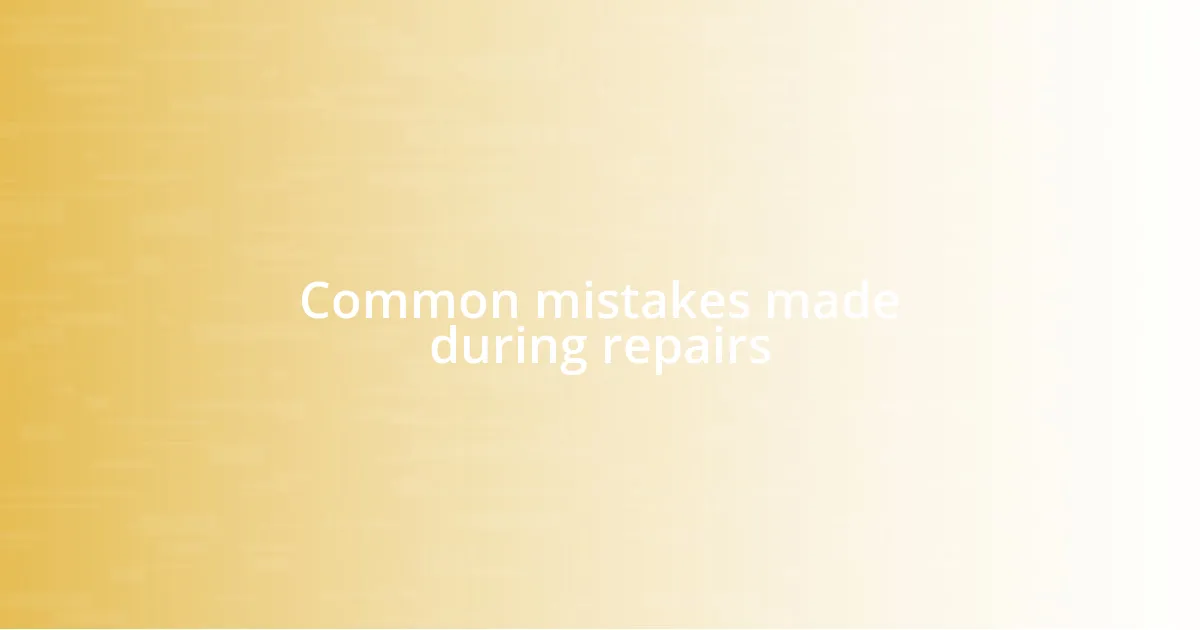
Common mistakes made during repairs
One common mistake I often see during repairs is underestimating the scope of the project. I remember when I decided to replace an old faucet. I thought it would be a quick job, but once I got into it, I realized I needed additional tools and parts, which turned my simple task into a full afternoon affair. Have you ever jumped into a project without fully understanding what it would entail? I know the frustration that comes from that.
Another pitfall is failing to take adequate safety precautions. I once dove headfirst into a home electrical repair without switching off the breaker, and let’s just say, my heart raced when I got an unexpected shock. It was a sobering moment that taught me how vital it is to prioritize my safety first—something I now emphasize to anyone who asks for repair advice.
Lastly, I’ve seen people often neglect to read instructions or guidelines. I vividly recall assembling a piece of furniture without looking at the manual, convinced I could figure it out on my own. Well, it ended up wobbly, and I had to backtrack through the entire process. It reminded me that taking the time to read and understand instructions can save you a lot of headaches—and heartaches—down the line. Isn’t it funny how slowing down could lead to a much smoother experience?

Tools that made repairs easier
When it comes to tools that made repairs easier, my trusty cordless drill quickly comes to mind. I remember the first time I used it; I was assembling a bookshelf. The task went from what felt like an overwhelming chore to a satisfying breeze. I could move from one step to the next with precision and speed. Have you ever felt that rush of efficiency when the right tool clicks into place? It’s liberating!
Another game-changer for me has been a good-quality multi-tool. I can’t recount how many times I’ve reached for it while tightening screws or cutting through stubborn materials. Its versatility means it’s always within arm’s reach, ready for whatever comes my way. The ease this tool has brought to simple tasks feels almost magical. But let me ask you—have you ever stared blankly at a project, wishing for a helper? That’s when I found my multi-tool to be that perfect assistant, always ready to lend a hand.
Lastly, I can’t forget about my stud finder. The first time I used it to mount a shelf was a lesson in stress relief. Before, I would painstakingly tap the wall, praying to find the right spot without messing things up. However, this tool transformed the process completely, saving me from countless holes and repairs. Isn’t it a relief when technology steps in to simplify our lives? Tools like these not only aid in physical repairs but also boost our confidence, knowing we have the right support to tackle projects head-on.

How repairs changed my perspective
Engaging in repairs has significantly reshaped my perspective on patience and resilience. I recall attempting to fix a wobbly chair, convinced it would be a mere five-minute job. After struggling with stubborn screws and the wrong angle for what felt like an eternity, I realized that some fixes require a step back and a moment of reflection. Have you experienced that sense of determination when a project stretches your patience? It actually turned into a valuable lesson in facing challenges head-on.
The most profound change, however, has been in how I view failures. There’s real value in every misstep I’ve encountered, and I can clearly remember the pride I felt after reassembling an appliance that had spun wildly out of control during my first attempt. At the time, I wanted to toss it out, but instead, I embraced the chance to learn from my errors. Isn’t it fascinating how a misjudgment can turn into a stepping stone for growth? I now embrace mistakes—not as setbacks, but as integral parts of the learning process.
Finally, I can’t overlook how repairs have amplified my appreciation for the small victories. Each successful fix, no matter how minor, feels like a personal triumph. I remember standing back and admiring a patched-up wall all on my own, feeling a swell of pride. It’s those moments that remind me that taking on challenges, even the ones that seem trivial, fosters a real sense of accomplishment. Have you celebrated similar small wins? They often carry more weight than we realize, shaping our confidence and outlook on life.
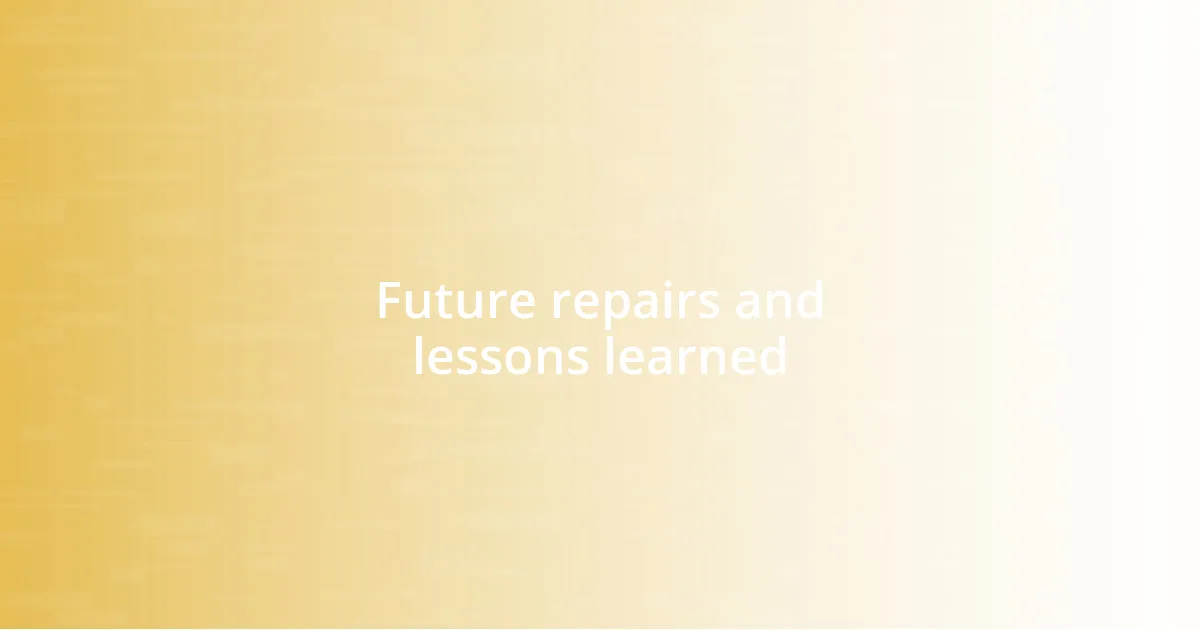
Future repairs and lessons learned
My experiences with repairs have taught me that preparation is everything. I vividly remember a time when I decided to paint my living room. I dove in without gathering supplies, only to find myself running back and forth, hunting for brushes, tape, and drop cloths. This chaotic process not only slowed me down but also added unnecessary stress. Have you ever felt overwhelmed because you skipped a simple step? Now, I make it a point to gather all the necessary tools before tackling a project. This simple shift has made future repairs much more manageable.
Another key lesson I’ve internalized is the importance of asking for help. I recall when I attempted to fix my garden shed solo, thinking I could handle it all. After struggling for hours with heavy panels, I finally called a friend to lend a hand. The moment they arrived, I felt an immediate wave of relief. There’s something transformative about collaboration, isn’t there? It not only speeds up the process but also makes the work feel lighter. Moving forward, I embrace teamwork more openly, knowing that shared experiences enhance both the joy and efficiency of repairs.
Lastly, I’ve come to appreciate the learning curve associated with repairs. I remember the first time I tried to replace a faucet; it was a comedy of errors. Water sprayed everywhere, and I ended up drenched but laughing at my mishap. What I realized was that each attempt, no matter how clumsy, brought me closer to mastery. Have you ever viewed a do-it-yourself challenge as an opportunity for growth rather than a daunting task? By framing future repairs through this lens, I find excitement in tackling new projects, knowing they contribute to my skills and confidence.










